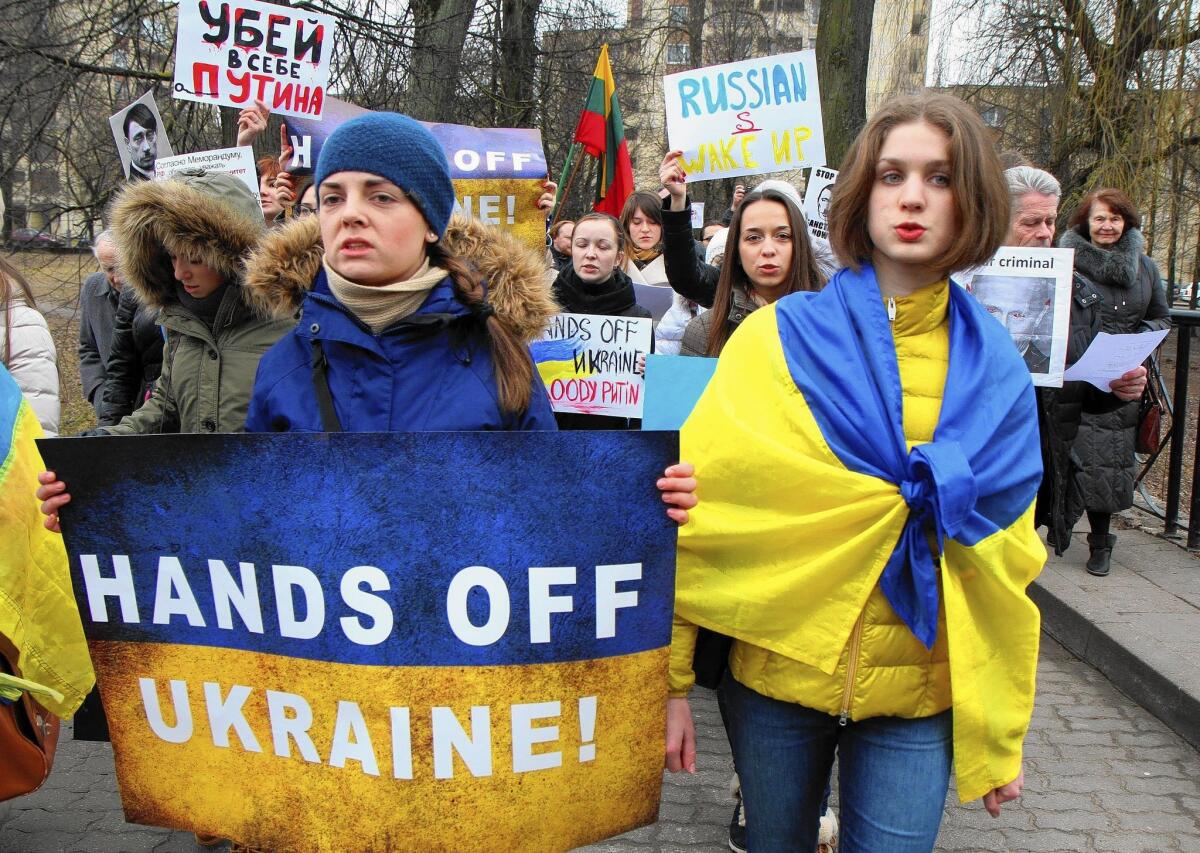Talk of financial aid for Ukraine gains traction

WASHINGTON — Russia’s military action in Crimea has strengthened support for economic aid to beleaguered Ukraine, yet the multibillion-dollar package under discussion in world capitals still must navigate a treacherous course.
With Russian troops now essentially in control of Ukraine’s Crimean peninsula, President Obama challenged lawmakers who have been demanding tough action to start with an aid package to help shore up the fledgling government in Kiev, the Ukrainian capital.
Obama said Monday that he’d heard “a lot of talk from Congress about what should be done.” He said the first order of business should be assistance “that stands above partisan politics.”
Treasury Secretary Jack Lew said Sunday that the Obama administration would work with other governments to provide “all the assistance Ukraine needs,” and the Group of 7 leading industrialized nations committed itself to “strong financial backing.”
How much money Ukraine needs to keep its economy from collapse is in some dispute, but by most reckonings the figure is huge.
Steven Pifer, a former U.S. ambassador to Ukraine now at the nonpartisan Brookings Institution, said a financial bailout for Ukraine’s obligations could require $15 billion to $20 billion this year and as much as $15 billion next year.
By comparison, U.S. economic aid to all countries totaled $31 billion last year.
Secretary of State John F. Kerry last week said the Obama administration was contemplating an immediate $1-billion loan guarantee, possibly joined by an undisclosed amount in direct aid, to help Ukraine meet its obligations. Europe was considering about $1 billion, he said.
Senior lawmakers indicated they were willing to listen. House Majority Leader Eric Cantor (R-Va.) and Sen. Robert Menendez (D-N.J.), chairman of the Senate Foreign Relations Committee, say they are ready to consider aid, although it’s not clear if they agree on the details in an era of budget cuts.
Menendez said Monday that lawmakers were working on legislation to fund the $1-billion loan guarantee as well as help with energy reforms, elections, strengthening of civil society, anti-corruption efforts and the recovery of stolen assets.
Cantor suggested a more limited scope, saying the House was considering loan guarantees but with a caveat. “We must make sure it is done responsibly and any legislation is not delayed by adding divisive provisions,” he said.
The State Department is to present a legislative request for a loan guarantee to the House Foreign Affairs Committee on Tuesday, according to a committee aide. Officials appear to be seeking a path that might avoid confrontation with budget hawks who could hold up a costly aid package.
A senior congressional aide said discussions had focused on using $200 million that has already been appropriated for the State Department to pay for the loan guarantee.
But the aide, who said Kerry went “a lot over his skis” in his initial promise of aid, said there had been no decisions on further assistance. The aide spoke on condition of anonymity in describing sensitive discussions.
Administration officials are trying to make the case that providing aid to Ukraine doesn’t mean carrying an indefinite financial burden. Though it has developed a reputation for widespread corruption in the post-Soviet era, Ukraine is potentially wealthy with natural resources, agriculture and industry, they say.
“This is a short-term problem that results from the gross mismanagement and corruption and ripping off of the Ukrainian economy of the previous regime,” a senior administration official told reporters in a conference call Sunday, speaking on condition of anonymity.
Most of the money required for Ukraine’s bailout would come from the International Monetary Fund. Its officials tried to support the former government in Kiev for years but were deeply frustrated as Ukraine refused to reform its finances and repeatedly defaulted on obligations.
The transitional government that took over last month after President Viktor Yanukovich fled the country is pledging to take austerity steps right away. The steps could include raising prices for natural gas, which have been held artificially low, removing any incentive for business to develop Ukraine’s gas resources.
Raising prices is likely to generate a strong public backlash, however. Arseny Yatsenyuk, the acting prime minister, has referred to the current leadership team as a “kamikaze” Cabinet because he fears it will be thrown out because of resistance to government belt-tightening.
The IMF, which sent a team to Ukraine on Monday for a 10-day visit, has indicated it would like to delay a long-term deal with Ukraine until after the May 25 presidential election. Fund officials don’t like to negotiate deals with transitional governments that may soon be gone.
The government says it is willing to agree to the austerity steps right away, to open the way for the IMF to offer an infusion of about $1.4 billion, probably coupled with a similar amount from the European Union.
It’s not clear, however, if European countries will chip in directly to supplement the IMF contributions.
The French have been unenthusiastic, and German officials, who are already bankrolling other teetering European economies, have stressed that the solution to the crisis must lie in Ukrainian austerity rather than checks from abroad.
Anders Aslund, a Swedish economist who has studied Ukraine, said he expected that the Northern European nations, including Germany, the Netherlands and the Scandinavian countries, would chip in.
“They will be under huge pressure from Central European countries,” said Aslund, a senior fellow at the nonpartisan Peterson Institute for International Economics in Washington. “If Ukraine goes under, the Russians will be able to walk in and take over.”
kathleen.hennessey@latimes.com
More to Read
Start your day right
Sign up for Essential California for news, features and recommendations from the L.A. Times and beyond in your inbox six days a week.
You may occasionally receive promotional content from the Los Angeles Times.








